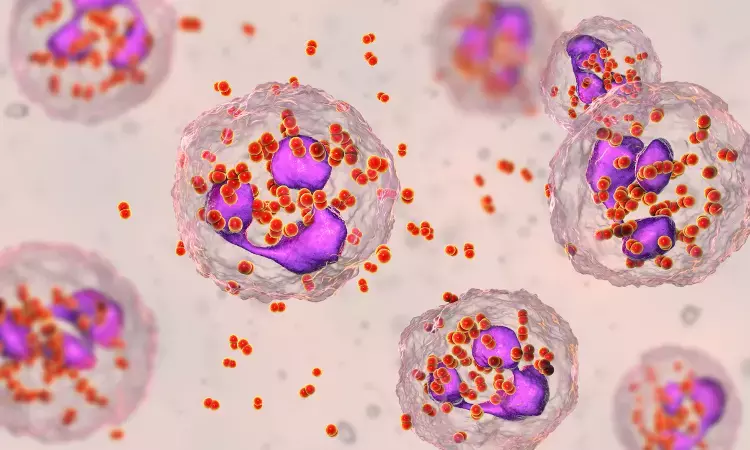- Home
- Medical news & Guidelines
- Anesthesiology
- Cardiology and CTVS
- Critical Care
- Dentistry
- Dermatology
- Diabetes and Endocrinology
- ENT
- Gastroenterology
- Medicine
- Nephrology
- Neurology
- Obstretics-Gynaecology
- Oncology
- Ophthalmology
- Orthopaedics
- Pediatrics-Neonatology
- Psychiatry
- Pulmonology
- Radiology
- Surgery
- Urology
- Laboratory Medicine
- Diet
- Nursing
- Paramedical
- Physiotherapy
- Health news
- Fact Check
- Bone Health Fact Check
- Brain Health Fact Check
- Cancer Related Fact Check
- Child Care Fact Check
- Dental and oral health fact check
- Diabetes and metabolic health fact check
- Diet and Nutrition Fact Check
- Eye and ENT Care Fact Check
- Fitness fact check
- Gut health fact check
- Heart health fact check
- Kidney health fact check
- Medical education fact check
- Men's health fact check
- Respiratory fact check
- Skin and hair care fact check
- Vaccine and Immunization fact check
- Women's health fact check
- AYUSH
- State News
- Andaman and Nicobar Islands
- Andhra Pradesh
- Arunachal Pradesh
- Assam
- Bihar
- Chandigarh
- Chattisgarh
- Dadra and Nagar Haveli
- Daman and Diu
- Delhi
- Goa
- Gujarat
- Haryana
- Himachal Pradesh
- Jammu & Kashmir
- Jharkhand
- Karnataka
- Kerala
- Ladakh
- Lakshadweep
- Madhya Pradesh
- Maharashtra
- Manipur
- Meghalaya
- Mizoram
- Nagaland
- Odisha
- Puducherry
- Punjab
- Rajasthan
- Sikkim
- Tamil Nadu
- Telangana
- Tripura
- Uttar Pradesh
- Uttrakhand
- West Bengal
- Medical Education
- Industry
Gepotidacin could be new treatment option for gonorrhea, suggests Phase 3 trial

A new study published in the journal of The Lancet showed that, with no new safety issues, gepotidacin showed no inferiority to ceftriaxone with azithromycin for urogenital N gonorrhoeae, providing a new oral treatment option for simple urogenital gonorrhea.
It has been demonstrated that gepotidacin, a first-in-class, bactericidal, triazaacenaphthylene antibiotic that prevents bacterial DNA replication, is both effective and well-tolerated when used to treat simple UTIs. Thus, to treat uncomplicated urogenital gonorrhea, Jonathan Ross and team assessed the safety and effectiveness of gepotidacin.
EAGLE-1 was a phase 3 study that compared oral gepotidacin (two 3000 mg doses given 10-12 hours apart) to intramuscular ceftriaxone (500 mg) and oral azithromycin (1 g) for the treatment of gonorrhea. The participants aged ≥12 years and ≥45 kg with confirmed or suspected uncomplicated urogenital gonorrhea were eligible. Randomization (1:1) was stratified by age, gender at birth, and sexual orientation (MSW, females, MSM).
Microbiological success with the removal of N. gonorrhoeae from the urogenital location by 4–8 days, was the main efficacy objective. A non-inferiority margin of -10% was established. The microbiological intention-to-treat (micro-ITT) population had those who had ceftriaxone-susceptible N. gonorrhoeae at baseline and received at least one dose, was utilized in the primary analysis
Between October 21, 2019, and October 10, 2023, 628 individuals were randomly assigned (314 to each group). Of these, 6% terminated early, primarily owing to a failure to follow-up. The micro-ITT population consisted of 406 individuals (202 gepotidacin, 204 ceftriaxone+azithromycin), the majority of whom were male (92%), and 71% identified as MSM.
Microbiological success at test-of-cure was 92.6% for gepotidacin and 91.2% for ceftriaxone with azithromycin, demonstrating non-inferiority. No urogenital N. gonorrhoeae was found in either group. Gepotidacin was associated with increased adverse events, including mild to severe GI problems, and no treatment-related major events.
Overall, without any new safety issues and a 93% treatment success rate, oral gepotidacin was not inferior to the usual combination of intramuscular ceftriaxone and azithromycin. The results are noteworthy since there aren't many other treatment choices available for one of the most common STDs worldwide.
Reference:
Ross, J. D. C., Wilson, J., Workowski, K. A., Taylor, S. N., Lewis, D. A., Gatsi, S., Flight, W., Scangarella-Oman, N. E., Jakielaszek, C., Lythgoe, D., Powell, M., Janmohamed, S., Absalon, J., & Perry, C. (2025). Oral gepotidacin for the treatment of uncomplicated urogenital gonorrhoea (EAGLE-1): a phase 3 randomised, open-label, non-inferiority, multicentre study. Lancet. https://doi.org/10.1016/s0140-6736(25)00628-2
Neuroscience Masters graduate
Jacinthlyn Sylvia, a Neuroscience Master's graduate from Chennai has worked extensively in deciphering the neurobiology of cognition and motor control in aging. She also has spread-out exposure to Neurosurgery from her Bachelor’s. She is currently involved in active Neuro-Oncology research. She is an upcoming neuroscientist with a fiery passion for writing. Her news cover at Medical Dialogues feature recent discoveries and updates from the healthcare and biomedical research fields. She can be reached at editorial@medicaldialogues.in
Dr Kamal Kant Kohli-MBBS, DTCD- a chest specialist with more than 30 years of practice and a flair for writing clinical articles, Dr Kamal Kant Kohli joined Medical Dialogues as a Chief Editor of Medical News. Besides writing articles, as an editor, he proofreads and verifies all the medical content published on Medical Dialogues including those coming from journals, studies,medical conferences,guidelines etc. Email: drkohli@medicaldialogues.in. Contact no. 011-43720751


